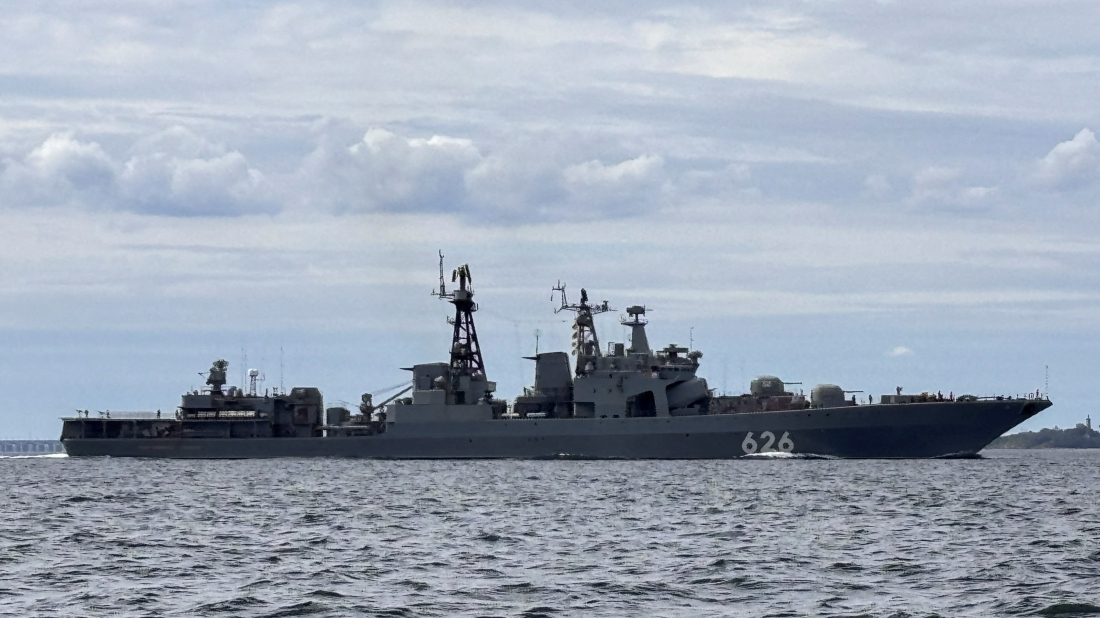Man with loaded shotgun and tactical gear arrested near U.S. Capitol, police say
An unidentified man was taken into custody on Tuesday (17 February) after running towards the U.S. Capitol carrying a loaded shotgun and wearing tacti...

Russian warships have repeatedly manoeuvred on collision courses, aimed weaponry at Danish naval vessels, and disrupted navigation systems in Denmark's straits, which connect the Baltic Sea to the North Sea, according to the Danish Defence Intelligence Service on Friday.
These incidents carry the risk of unintended escalation, the service warned.
The Baltic region remains on high alert following incidents involving undersea cables, gas pipeline outages, airspace violations, and drone sightings since Russia's 2022 invasion of Ukraine, which has heightened tensions between Moscow and the West.
Denmark, a staunch supporter of Ukraine in its conflict with Russia, has increased its military budget and committed to acquiring long-range precision weapons capable of striking targets inside Russia.
Russian warships target Danish helicopters, says Danish intelligence
“We have observed several incidents in the Danish straits, where Danish air force helicopters and naval vessels have been targeted by tracking radars and weapons pointed at them from Russian warships,” said Danish Defense Intelligence Service Director Thomas Ahrenkiel at a press conference.
He explained that Russian warships had sailed on collision courses with Danish vessels during their passage through the straits.
Ahrenkiel added that a Russian warship had been anchored in Danish waters for over a week, raising concerns that Moscow could interfere if Denmark attempted to restrict the movements of Russia's "shadow fleet" of tankers circumventing Western sanctions on its oil exports due to the war in Ukraine.
In May, tensions escalated in the Baltic Sea when Russia deployed a fighter jet during Estonia’s interception of a Russian-bound oil tanker suspected of being part of the shadow fleet.
The Danish straits, a busy international shipping route, see frequent movement of Russian military vessels, often escorted by Denmark's navy.
Defense intelligence has also recorded Russian warships navigating through Danish straits with sonar and jamming equipment. Ahrenkiel stated that it was “highly probable” that, on at least one occasion, they had jammed signals and caused widespread GPS interference in Denmark.
Denmark's intelligence service has concluded that Russia is waging hybrid warfare against Denmark and the wider West.
"Russia is using military means, in an aggressive manner, to pressure us without crossing into traditional armed conflict," said Ahrenkiel.
Moscow has consistently denied involvement in hybrid attacks in Europe. President Vladimir Putin joked on Thursday that he would no longer fly drones over Denmark and dismissed the suggestion that his country might target a NATO member as “nonsense.”
No direct military threat despite incidents
Despite the series of incidents, the defence intelligence service emphasised that there was no direct military threat to Denmark.
However, Prime Minister Mette Frederiksen referred to recent drone incursions over Danish airports and military installations as a “hybrid attack” on the country.
Defense Minister Troels Lund Poulsen stated that investigations into the incidents were ongoing, but no conclusions had been reached regarding the identity of the perpetrators.
Western security agencies have increasingly flagged hybrid threats, including sabotage, disinformation, espionage, and cyberattacks, as more aggressive.
In response to the drone incursions, NATO has reinforced its Baltic operations. Sweden proposed new legislation on Friday to expand maritime surveillance by its coast guard.
Cuba’s fuel crisis has turned into a waste crisis, with rubbish piling up on most street corners in Havana as many collection trucks lack enough petrol to operate.
Iran’s Revolutionary Guards navy held military exercises in the Strait of Hormuz on Monday (16 February), state-linked media reported. The drill took place a day before renewed nuclear negotiations between Tehran and Washington in Geneva.
The 2026 Munich Security Conference (MSC) unfolded over three intense days in Munich, confronting a defining question of our era: has the post-Second World War international order collapsed - and if so, what will replace it?
Britain and Germany’s highest ranking military chiefs have made an unprecedented joint appeal to the public to accept the “moral” case for rearmament and prepare for the threat of war with Russia.
Canadian Prime Minister, Mark Carney, announced on 16 February that the Honourable Janice Charette has been appointed as the next Chief Trade Negotiator to the United States. She's been tasked with overseeing the upcoming review of the Canada-United States-Mexico Agreement (CUSMA).
An unidentified man was taken into custody on Tuesday (17 February) after running towards the U.S. Capitol carrying a loaded shotgun and wearing tactical gear, according to Capitol Police Chief Michael Sullivan.
Peru’s Congress has voted to censure and remove José Enrique Jeri Ore from his posts as President of Congress and acting President of the Republic, just four months into his tenure, citing undisclosed meetings with Chinese businessmen and alleged hiring irregularities.
French supporters celebrated outside the biathlon stadium in Anterselva on Tuesday (17 February) after France claimed Olympic gold in the men’s relay, describing the race as thrilling and the atmosphere electric.
Day 11 of the Milano Cortina 2026 Winter Olympics delivered decisive performances, medal celebrations and emotional tributes as the Games moved deeper into their final stages.
The Kremlin has sought to lower expectations ahead of the latest round of Ukraine peace talks in Geneva, saying no announcements should be expected on Tuesday as negotiations continue behind closed doors.
You can download the AnewZ application from Play Store and the App Store.

What is your opinion on this topic?
Leave the first comment